
The pros and cons of using professional translators vs. Google Translate to analyze open-ended survey responses
December 17, 2021Pew Research Center recently fielded a cross-national survey in which people around the world described, in their own words, where they find meaning in life. The analysis plan for this project hinged on developing a closed-ended codebook and applying it to nearly 19,000 open-ended responses, drawn from 17 societies and spanning 12 languages. … Read more
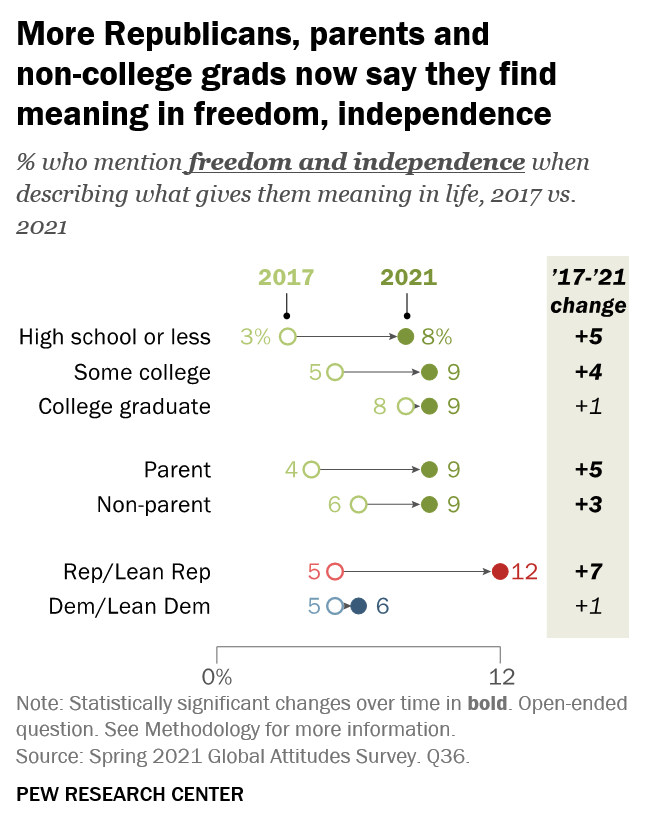
Where Americans find meaning in life has changed over the past four years
November 18, 2021Americans have evolved in where they find meaning in their lives, according to a new Pew Research Center analysis of surveys conducted in September 2017 and February 2021. In both years, the Center asked a representative sample of U.S. adults to answer the following question in their own words: “What… Read more
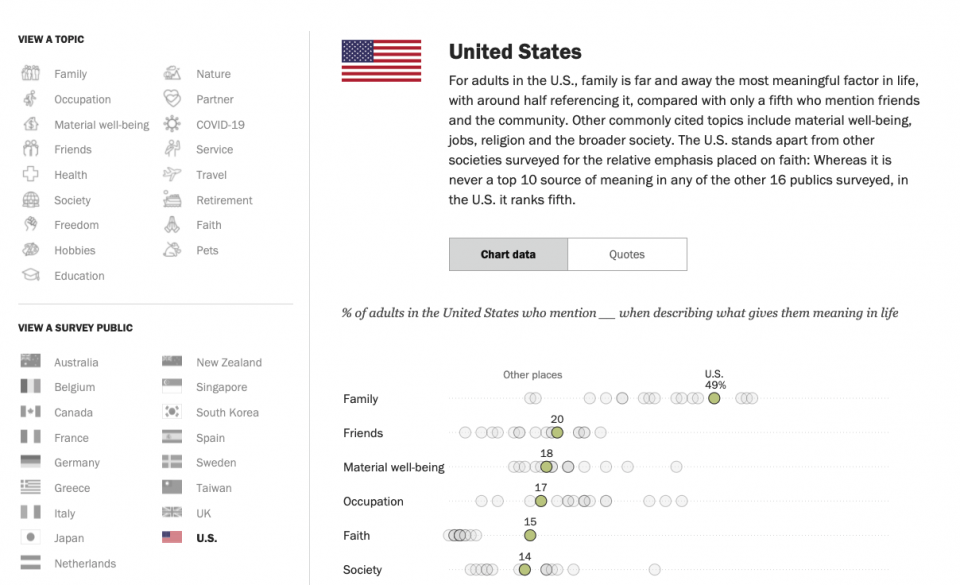
Where people around the world find meaning in life
November 18, 2021In the spring of 2021 – as COVID-19 raged across many parts of the world – we asked nearly 19,000 adults in 17 publics where they find meaning in their lives and what keeps them going. While there are some similarities between the places surveyed – for example, family is a top… Read more
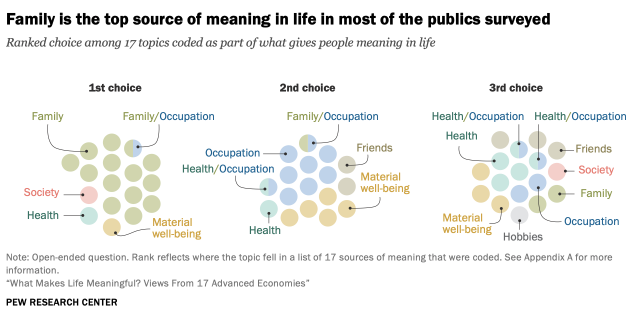
What Makes Life Meaningful? Views From 17 Advanced Economies
November 18, 2021What do people value in life? How much of what gives people satisfaction in their lives is fundamental and shared across cultures, and how much is unique to a given society? To understand these and other issues, Pew Research Center posed an open-ended question about the meaning of life to… Read more
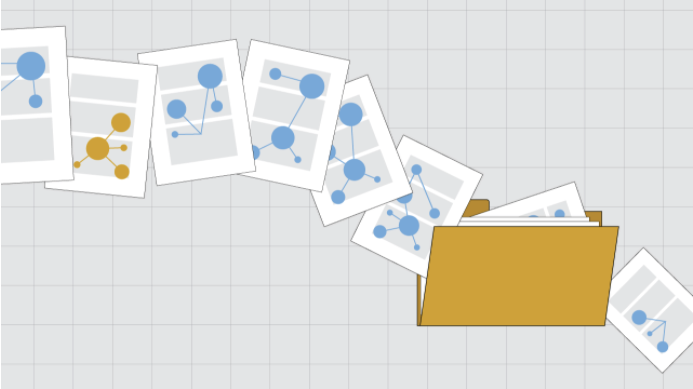
Are topic models reliable or useful?
September 24, 2021For now, the evidence suggests that even with intense curation, scrutiny and validation, topic models are not particularly well-suited for classification. Instead, their strength lies in exploratory analysis, where they can serve as tools of suggestion: Topic models can help guide researchers toward more curated measurement instruments informed by a… Read more

How keyword oversampling can help with text analysis
September 24, 2021Keyword oversampling can be a powerful way to analyze uncommon subsets of text data. Read more Read more
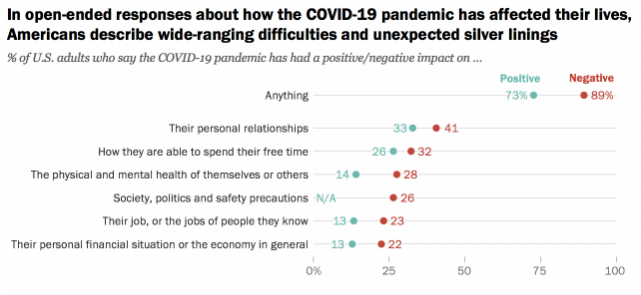
In their own words, Americans describe the struggles and silver linings of the COVID-19 pandemic
March 5, 2021The outbreak has dramatically changed Americans’ lives and relationships over the past year. We asked people to tell us about their experiences – good and bad – in living through this moment in history. Read more Read more
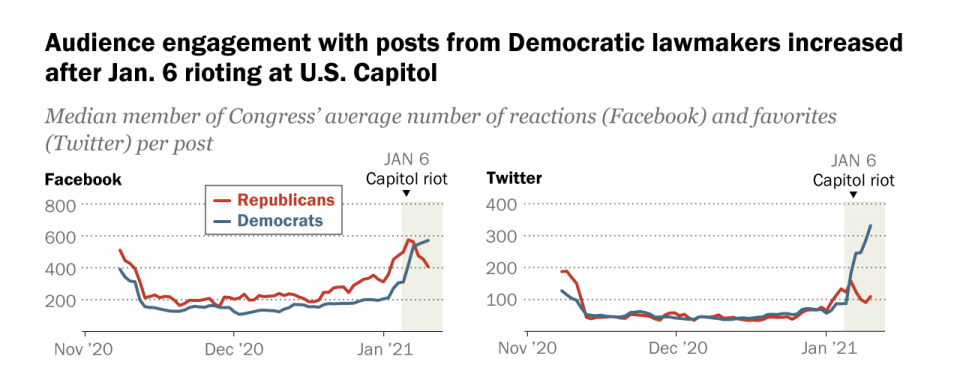
How lawmakers’ social media activity changed in the days after the U.S. Capitol riot
January 15, 2021Social media activity by members of Congress changed in notable ways following the Jan. 6 rioting at the U.S. Capitol by supporters of President Donald Trump, according to a new Pew Research Center analysis of lawmakers’ Facebook and Twitter posts in the days after the breach. Read more Read more
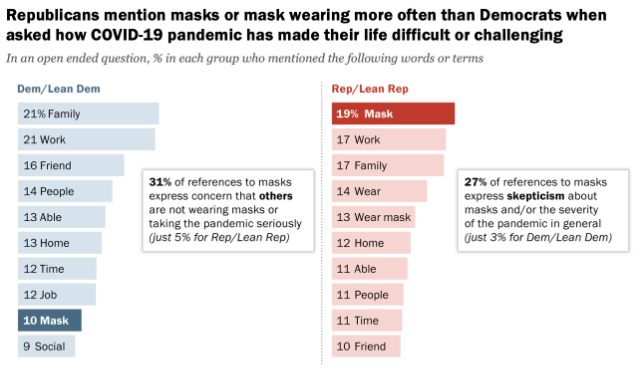
Both Republicans and Democrats cite masks as a negative effect of COVID-19, but for very different reasons
October 29, 2020The COVID-19 outbreak has upended life across the United States and exposed growing divisions between supporters of the two major political parties. And when Americans are asked to describe in their own words how the outbreak has affected them negatively, no topic divides Democrats and Republicans more than the subject of masks, according… Read more
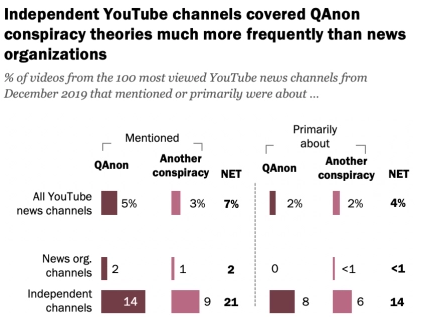
Many Americans Get News on YouTube, Where News Organizations and Independent Producers Thrive Side by Side
September 28, 2020Americans are as likely to often turn to independent channels as they are to established news organization channels; videos from independent news producers are more likely to cover subjects negatively, discuss conspiracy theories Read more Read more

Congress Soars to New Heights on Social Media
July 16, 2020As social media platforms like Facebook and Twitter have become ingrained in political and popular culture, a new Pew Research Center analysis of every tweet and Facebook post from members of Congress since 2015 finds that the congressional social media landscape has undergone vast changes in recent years. These shifts… Read more

Introducing Pew Research Center’s Python libraries
June 9, 2020Over the past five years, Pew Research Center’s Data Labs team has worked hard to steadily advance the Center’s data science capabilities. From text analysis to computer vision, we’ve applied a variety of computational methods to study important social issues in new ways and expand the scope of what’s possible for the Center. In doing… Read more
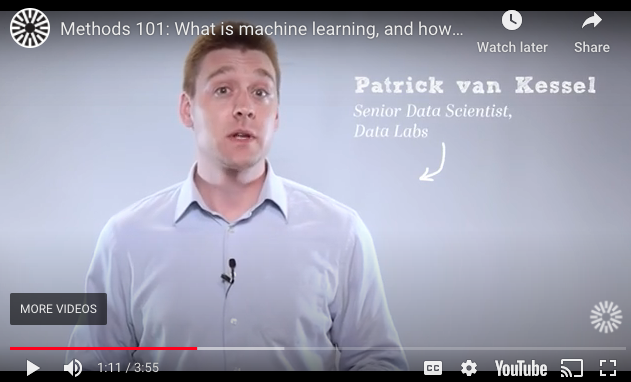
What is machine learning, and how does it work?
June 4, 2020In this explainer, learn about the concept of machine learning and how Pew Research Center can use it to collect and analyze large pools of data. Full post: https://www.pewresearch.org/fact-tank/2020/06/04/what-is-machine-learning-and-how-does-it-work/ Read more
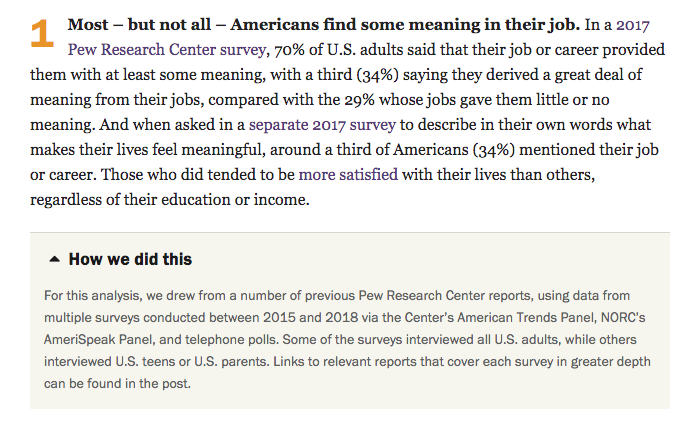
How Americans feel about the satisfactions and stresses of modern life
February 5, 2020Most Americans are at least somewhat happy with their lives, but some have grappled with issues like loneliness and isolation, work-life balance and finding meaning and purpose. Over the years, Pew Research Center has conducted surveys in all these areas. Here are nine things we’ve learned from them about how… Read more
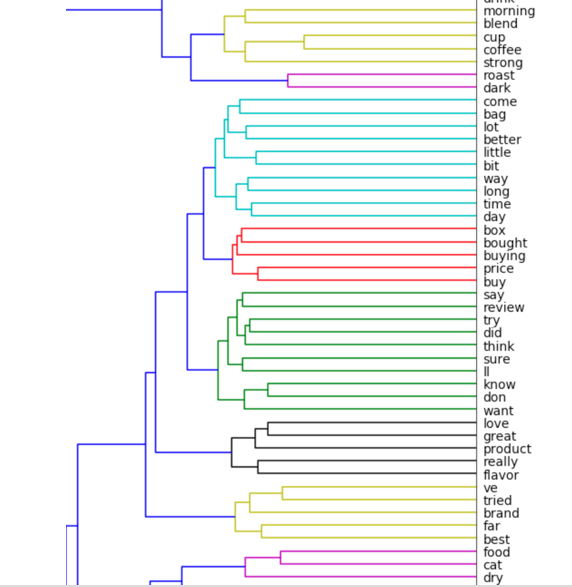
Webinar: AAPOR 2019 – Intro to Text Analytics for Social Scientists
December 12, 2019Slides: https://www.slideshare.net/secret/35s0M1acFgadAo Read more
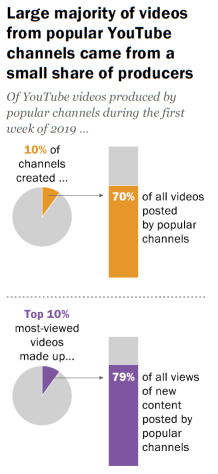
10 facts about Americans and YouTube
December 4, 2019Using a combination of public opinion surveys and large-scale data analysis, Pew Research Center has studied YouTube in recent years to better understand the content that gets posted to the site and how the U.S. public engages with it. Here are 10 key takeaways from our research. Read more Read more
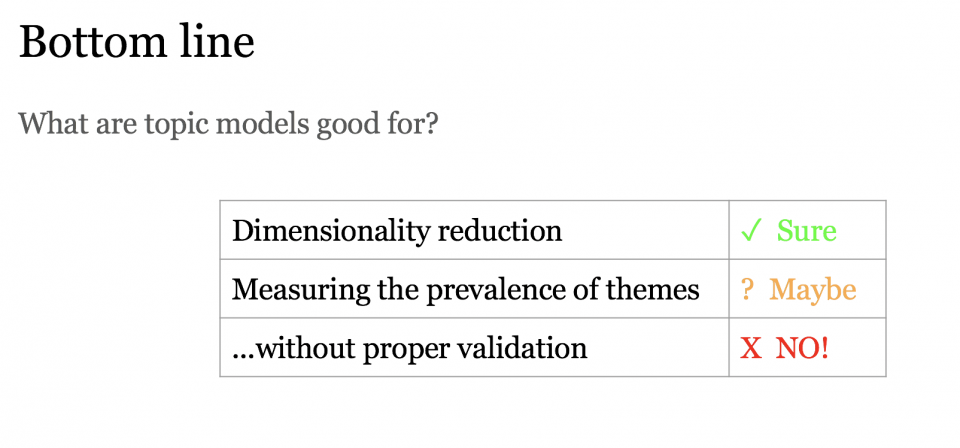
Presentation: APSA 2019 – Semi-Supervised Topic Models
August 31, 2019Slides: https://www.slideshare.net/secret/xWl6994Ph1N4VF Read more

Podcast: WashingTECH 2019 – Kids and YouTube
August 20, 2019Podcast: https://techpolicypodcast.org/kids-and-youtube-with-patrick-van-kessel-ep-197/ Read more
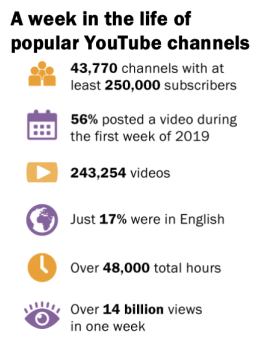
A Week in the Life of Popular YouTube Channels
July 25, 2019An analysis of every video posted by high-subscriber channels in the first week of 2019 finds that children’s content – as well as content featuring children – received more views than other videos. Read more Read more
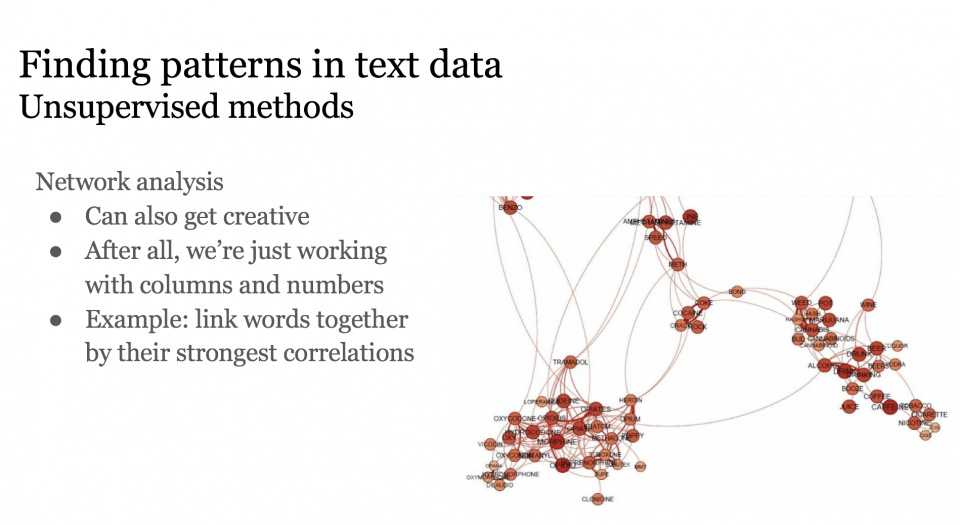
Presentation: World Bank 2019 – Text Analytics Workshop
July 18, 2019Slides: https://www.slideshare.net/secret/NaZYO82hWSxTvV Read more
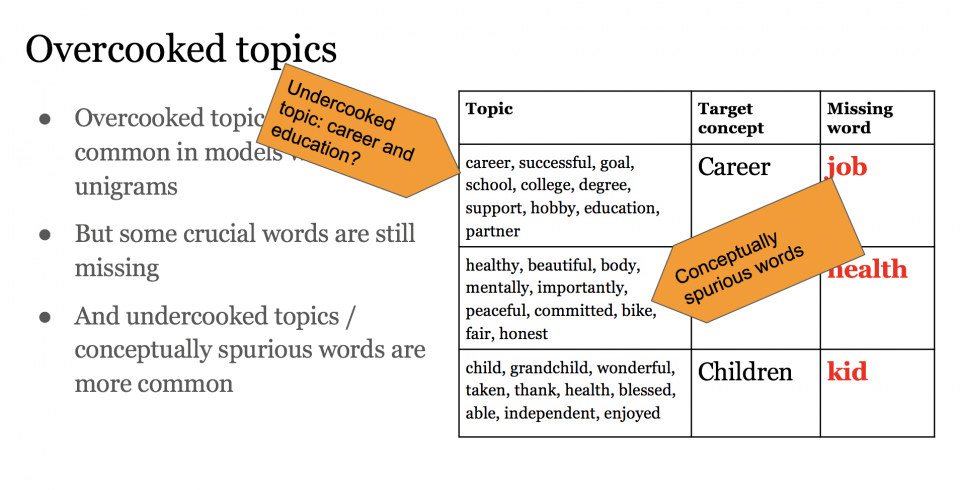
Presentation: NYAAPOR 2019 – An Intro to Topic Models for Text Analysis
June 3, 2019Slides: https://www.slideshare.net/secret/65ePdXWxgvIX8B Read more

Presentation: OECD Forum 2019 – Pressures of Modern Life
May 20, 2019Webcast: https://oecd.streamakaci.com/052019/vod/day/1/room/3/hour/13:30/lang/fl Read more

Overcoming the limitations of topic models with a semi-supervised approach
April 10, 2019In two earlier posts on this blog, I introduced topic models and explored some of the difficulties that can arise when researchers attempt to use them to measure content. In this post, I’ll show how to overcome some of these challenges with what’s known as a “semi-supervised” approach. Read more Read more
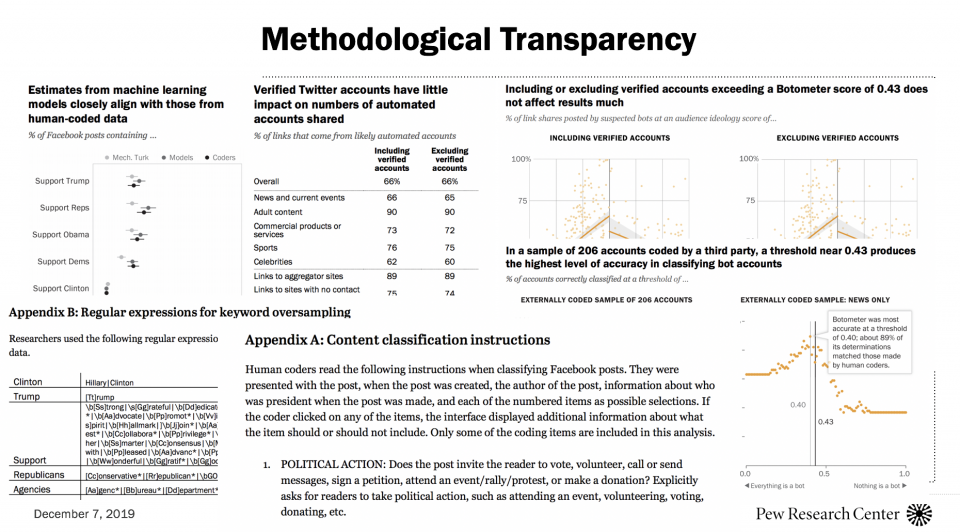
Presentation: University of Chicago 2019 – Data Science at Pew Research Center
February 20, 2019Slides: https://www.slideshare.net/secret/pXWUCON6aHv2MH Read more
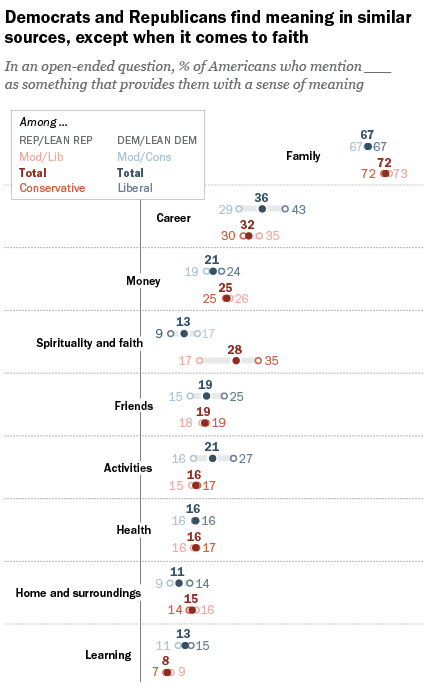
Members of both parties find meaning in family but differ when it comes to faith
November 30, 2018Democrats and Republicans are increasingly divided in their political values, but there are some things in life they generally agree on. When asked in a national survey to say what makes their lives meaningful, Americans across the political spectrum placed family at the top, and partisan differences were modest among those… Read more
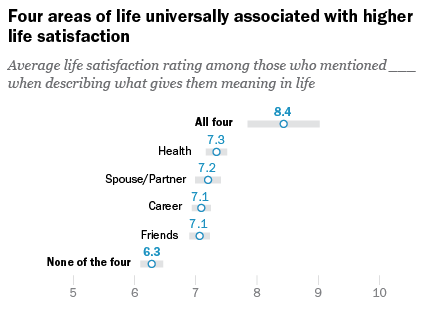
Americans who find meaning in these four areas have higher life satisfaction
November 20, 2018Discovering where people find meaning in life is a challenging task. One way is to give them an opportunity to write, in their own words, about the things that give them a sense of meaning and satisfaction with their lives. When we asked U.S. adults in a survey conducted last… Read more
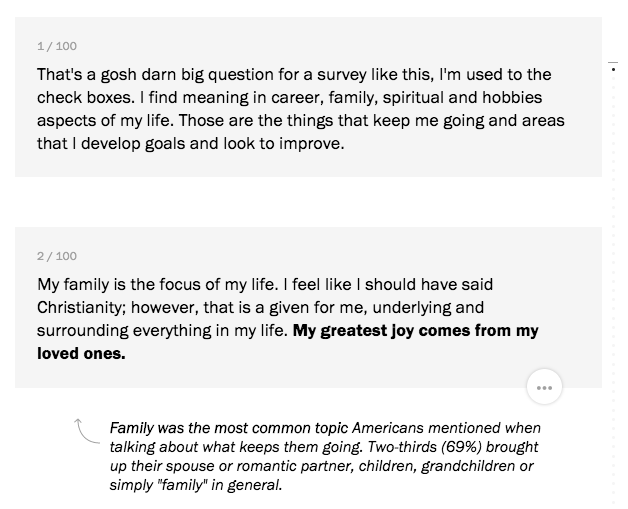
What Keeps Us Going
November 20, 2018In September 2017, we asked thousands of Americans where they find meaning in life. Their responses were rich, thoughtful and varied, and we have selected 100 to share with you in no particular order. We encourage you to explore the reflections of Americans from many walks of life. Some are… Read more
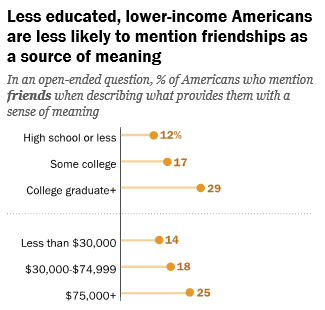
Where Americans Find Meaning in Life
November 20, 2018Economic, religious and political divides shape where Americans find meaning – but family, career and friendship emerge as common themes. Read more Read more
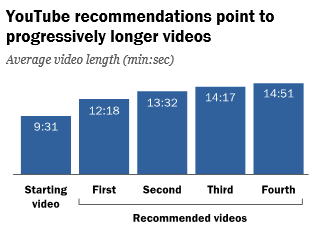
Many Turn to YouTube for Children’s Content, News, How-To Lessons
November 7, 2018An analysis of videos suggested by the site’s recommendation engine finds that users are directed toward progressively longer and more popular content. Read more Read more
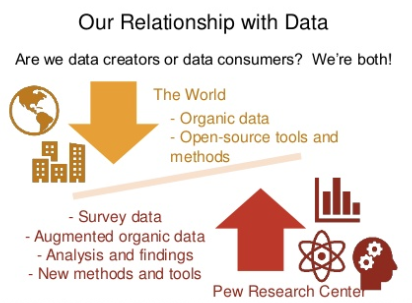
Presentation: OS3 2018 – Data at Pew Research Center
October 15, 2018Slides: https://www.slideshare.net/secret/AuIAOZOjzymuRc Read more

Presentation: Text as Data 2018 – Finding Meaning in Text
September 21, 2018Slides: https://www.slideshare.net/secret/lCOJuveElAXUyl Read more

An intro to topic models for text analysis
August 13, 2018If you’ve ever had to analyze a set of documents — such as social media posts, open-ended survey responses, focus group transcripts, software logs, etc. — you may have wondered about natural language processing (NLP). NLP is an umbrella term that encompasses a wide variety of algorithmic methods that can… Read more

Making sense of topic models
August 13, 2018In my first post about topic models, I discussed what topic models are, how they work and what their output looks like. The example I used trained a topic model on open-ended responses to a survey question about what makes life feel fulfilling and examined three topics in particular. Read more Read more
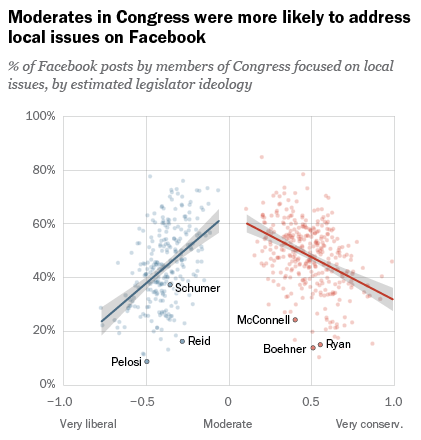
Moderates in Congress go local on Facebook more than the most ideological members
July 25, 2018While highly ideological members of Congress tend to use their Facebook posts to criticize political opponents and support their allies, moderate lawmakers are more likely to concentrate on local issues in their outreach on the platform, according to a new Pew Research Center analysis covering Jan. 1, 2015, to Dec. 31,… Read more
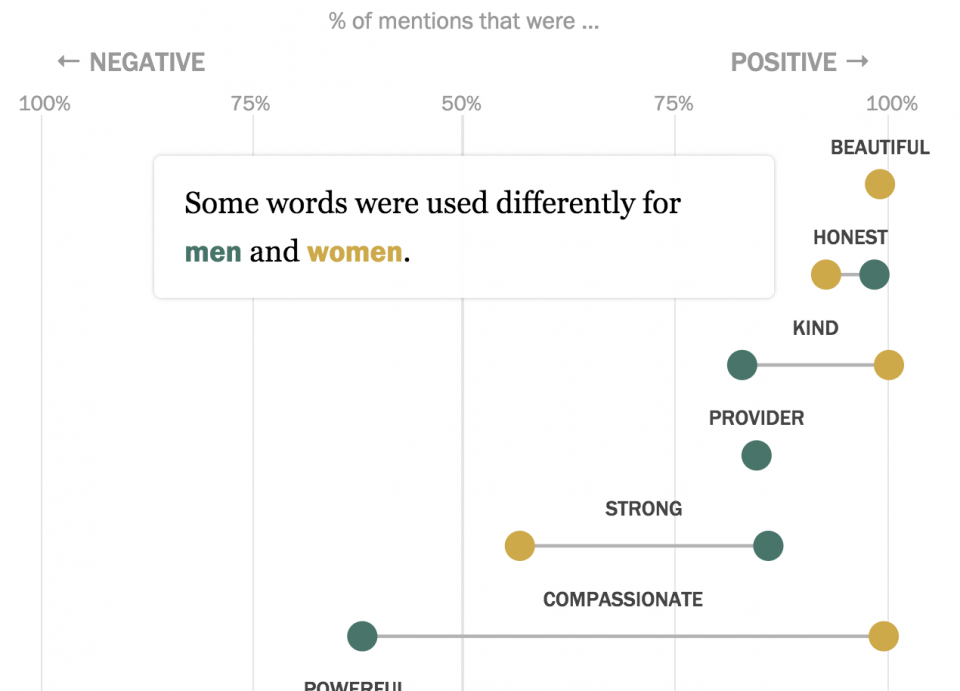
Strong Men, Caring Women: How Americans describe what society values (and doesn’t) in each gender
July 24, 2018Honesty. Strength. Beauty. What traits does society value most in men and in women? What traits does society say men and women should not have? Last year, Pew Research Center asked 4,573 Americans these questions. The respondents answered with more than 1,500 unique words describing traits that they think society… Read more
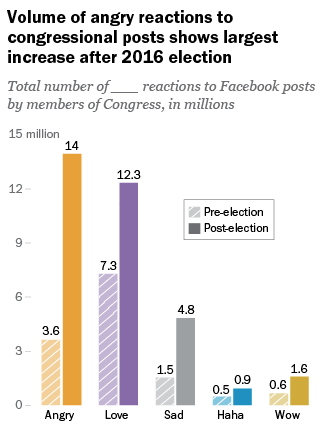
‘Anger’ topped ‘love’ when Facebook users reacted to lawmakers’ posts after 2016 election
July 18, 2018After the 2016 presidential election, Facebook users began using the “angry” button much more often when reacting to posts created by members of Congress. Read more Read more
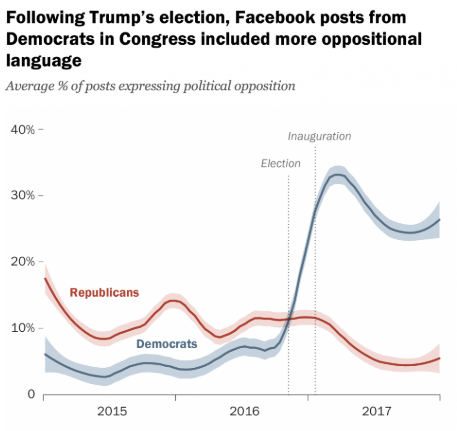
Taking Sides on Facebook: How Congressional Outreach Changed Under President Trump
July 18, 2018Democratic legislators’ opposition to political adversaries on Facebook spiked after Trump’s election, while “angry” reactions to posts by members of Congress increased among followers. Read more Read more
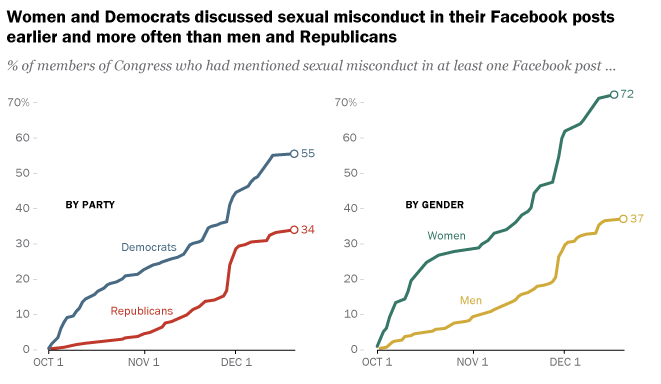
There’s a large gender gap in congressional Facebook posts about sexual misconduct
February 1, 2018As disclosures about sexual misconduct emerged last year, 44% of all members of Congress raised the issue on their official Facebook accounts. But the percentage of women legislators who discussed the topic in their official Facebook posts was almost twice as high as the percentage of men in Congress who… Read more
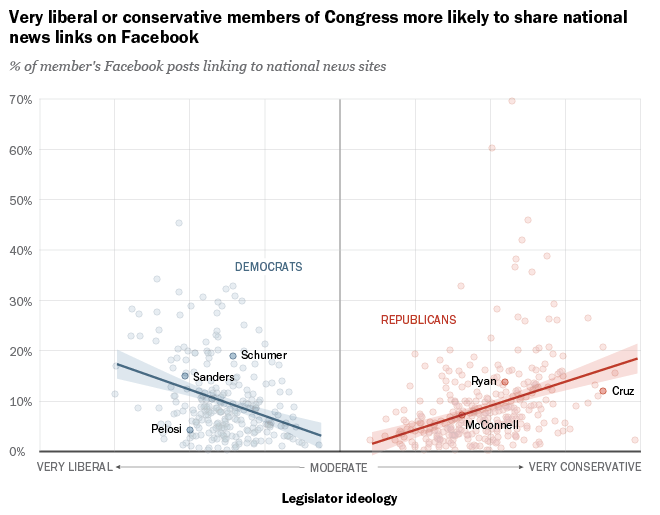
Very liberal or conservative legislators most likely to share news on Facebook
January 19, 2018The most ideological members of Congress shared news stories on their Facebook pages more than twice as often as moderate legislators between Jan. 2, 2015, and July 20, 2017, according to a new Pew Research Center study that examined all official Facebook posts created by members of Congress in this… Read more
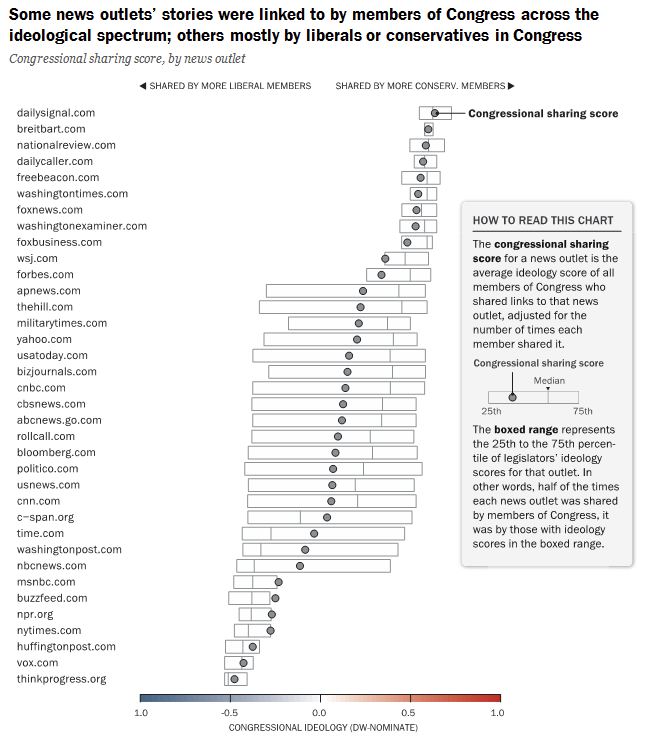
Sharing the News in a Polarized Congress
December 18, 2017Political divides in the American news landscape do not end with Americans’ preferences for different news sources; rather, they extend to how members of the U.S. Congress communicate with constituents in the digital age. Read more Read more
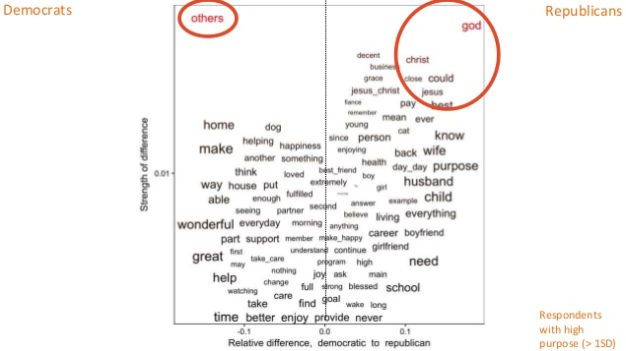
Presentation: AAPOR 2017 – Mapping the Meaning of Life
May 19, 2017Slides: https://www.slideshare.net/secret/OtMhXMbap1iOA Read more
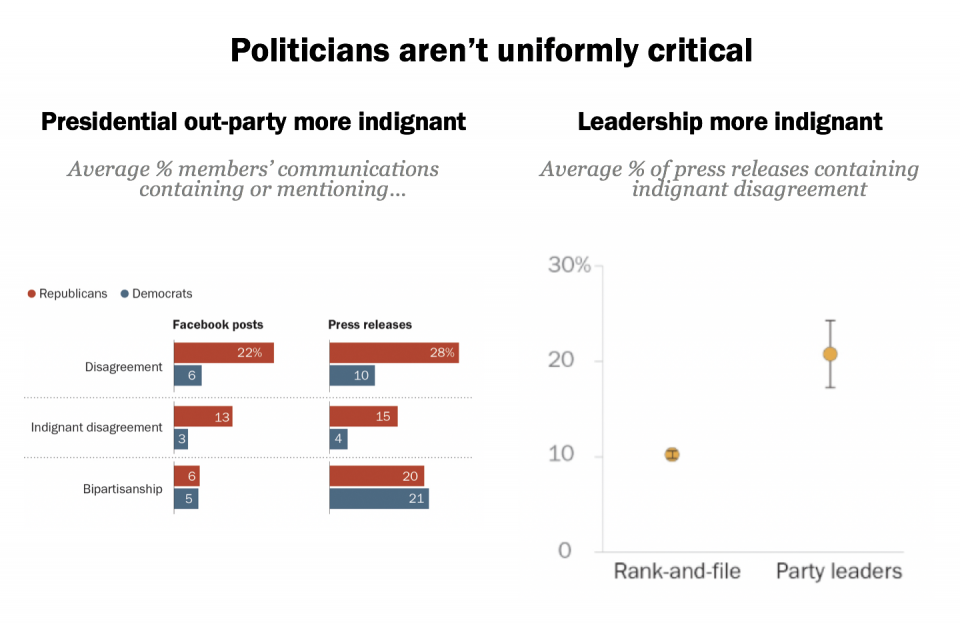
Presentation: MIT 2017 – Measuring Partisan Conflict with Machine Learning
March 20, 2017Slides: https://www.slideshare.net/secret/CJOhRr2QHGhXYq Read more
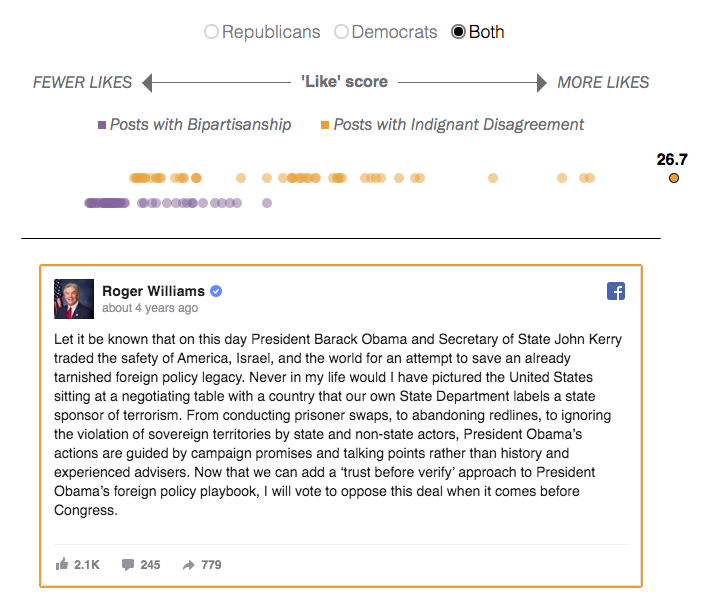
For members of 114th Congress, partisan criticism ruled on Facebook
February 23, 2017Facebook posts from members of the 114th Congress attracted more attention when they contained disagreement with the opposing party than when they expressed bipartisanship, according to a Pew Research Center analysis of over 100,000 posts. Read more Read more
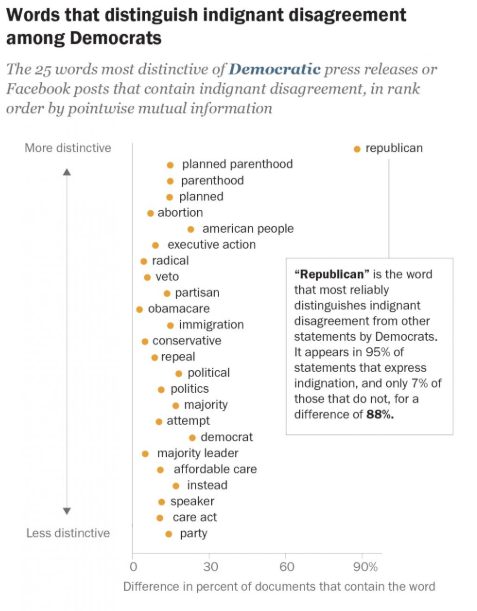
Partisan Conflict and Congressional Outreach
February 23, 2017A new Pew Research Center analysis of more than 200,000 press releases and Facebook posts from the official accounts of members of the 114th Congress uses methods from the emerging field of computational social science to quantify how often legislators themselves “go negative” in their outreach to the public. Read… Read more
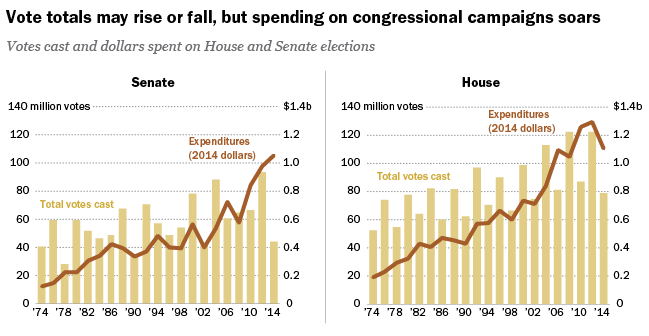
As more money flows into campaigns, Americans worry about its influence
December 7, 2015There’s more money in the political system than at any time since the reforms of the 1970s, a trend that concerns most Americans regardless of party or ideology. Read more Read more
